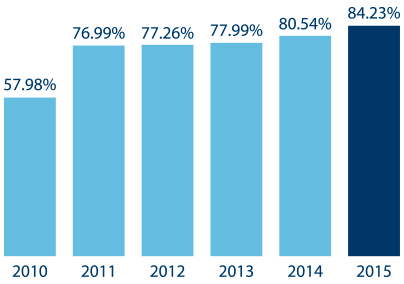Social And Ethics Committee Report
The Clicks Group social and ethics committee is constituted as a formal committee of the board in terms of the Companies Act. The committee is governed by a formal charter and has an independent role. This report is prepared in compliance with the requirements of the Companies Act.
Role of the committee
The social and ethics committee acts in terms of the delegated authority of the board and assists the directors in monitoring the group’s activities in terms of legislation, regulation and codes of best practices relating to:
- ethics;
- stakeholder engagement, including employees, customers, communities and the environment; and
- strategic empowerment and transformation.
Responsibilities of the committee
The responsibilities of the committee are as follows:
- monitor activities relating to social and economic development, good corporate citizenship, the environment, and health and public safety;
- ensure appropriate short and long-term targets are set by management;
- monitor progress on strategic empowerment and performance against targets;
- monitor changes in the application and interpretation of empowerment charters and codes; and
- monitor functions required in terms of the Companies Act and its regulations.
Composition and functioning
The committee comprises three independent non-executive directors, namely David Nurek (chairman), Professor Fatima Abrahams and Dr Nkaki Matlala, and two executive directors, David Kneale (chief executive) and Bertina Engelbrecht (group human resources director).
David Nurek is a highly experienced company director and former legal professional; Professor Fatima Abrahams is an accomplished academic in the field of industrial psychology and consults widely on human resources and transformation; and Dr Nkaki Matlala is a senior executive within the private healthcare sector and a representative on the Public Health Enhancement Fund.
The effectiveness of the committee is assessed as part of the annual board and committee self-evaluation process.
Activities of the committee
The committee met twice during the year and performed the following activities:
- monitored progress against transformation targets across all areas of strategic empowerment;
- monitored progress against its socio-economic development aspirations and the 10 principles set out in the United Nations Global Compact, with specific reference to the work undertaken by the Clicks Foundation, Clicks Helping Hand Trust, and the bursary and internship programmes for pharmacy students;
- monitored the group’s sustainability performance with specific reference to the JSE Socially Responsible Investment (SRI) Index and participation in the Carbon Disclosure Project; and
- monitored the group’s legal and regulatory compliance in the areas of environment, health and public safety, consumer relationship, labour and employment law.
While the group is not a signatory to the United Nations Global Compact, it has adopted the 10 principles and monitors compliance against these principles in the areas of human rights, labour, anti-corruption and the environment.
The group qualified for inclusion in the JSE SRI Index in the 2015 financial year.
BBBEE scorecard

Black empowerment and transformation
Clicks Group is committed to the spirit of the Broad-based Black Economic Empowerment (BBBEE) Act. The group’s transformation strategy is aligned to the Department of Trade and Industry’s (dti) codes of good practice.
Transformation is managed within a governance framework that includes the board’s social and ethics committee, the internal transformation committee, which is chaired by the chief executive and co-ordinated by the group human resources director, and the business unit transformation forums which are responsible for implementation.
The group maintained its level 3 BBBEE rating on the dti generic scorecard in the 2015 financial year and achieved an improved score of 84.23 points compared to 80.54 in the previous year.
|
BBBEE element |
Maximum |
2015 |
2015 |
2014 |
|
Ownership |
20 |
15.87 |
12.00 |
15.64 |
|
Management control |
10 |
9.18 |
7.97 |
8.83 |
|
Employment equity |
15 |
10.68 |
10.00 |
10.46 |
|
Skills development |
15 |
12.15 |
15.00 |
11.43 |
|
Preferential procurement |
20 |
16.35 |
14.00 |
14.19 |
|
Enterprise development |
15 |
15.00 |
15.00 |
15.00 |
|
Socio-economic development |
5 |
5.00 |
5.00 |
5.00 |
|
Total |
100 |
84.23 |
78.97 |
80.54 |
|
BBBEE level |
3 |
3 |
3 |
Ownership
The group achieved 15.87 (2014: 15.64) points on the ownership element of the scorecard which is attributable to the employee share ownership programme (ESOP) and an independent analysis conducted on the group’s shareholding to determine the level of beneficial black ownership.
At the end of the reporting period, 7 993 employees were shareholders in the ESOP scheme, with black employees accounting for 87% and women 64%. A dividend of R4.9 million (2014: R4.3 million) was paid to scheme participants this year. Since the inception of the ESOP in 2011, total dividends of R15.7 million have been paid out to employees.
Management control
The management control element of the scorecard is a reflection of the composition of the board of directors, group executive committee and senior management who are members of the business unit operating boards. The board comprises 44% black directors with females making up 33%. The group executive committee has 50% black representation and 25% female. The group achieved 9.18 (2014: 8.83) out of 10 points on this element.
Employment equity
The group is committed to creating a diverse workforce through the attraction and development of previously disadvantaged people, women and employees with disabilities. The group’s workforce comprises 90% (2014: 86%) black employees and 62% (2014: 63%) female. 70% of employees are below the age of 35 with 27% between 36 and 55 years.
The group supports the national agenda aimed at the employment of youth in sustainable positions. During the financial year, the group employed 3 649 employees under the age of 35 into permanent positions.
The group continues to align its employment equity targets and the national economically active population statistics, in line with the Department of Labour Director General’s review process since 2012.
The staff turnover of 18.8% (2014: 20.9%) is in line with the targeted range of 18% – 20%.
Skills development
The group remains committed to investing in the development of the skills, knowledge and capability of its employees. A total of R49.0 million (2014: R52.5 million) was invested in learning and skills development which equates to 2.9% of basic payroll (2014: 3.3%). A total of 4 156 employees (2014: 4 483) participated in learning and development interventions of which 83% were black employees and 62% females.
|
Learning and development statistics |
2015 |
2014 |
|
Learning and development spend as a % of payroll |
2.9 |
3.3 |
|
Learning and development spend (R’million) |
49.0 |
52.5 |
|
Employees trained |
4 156 |
4 483 |
|
Black employees as a % of all employees trained |
83 |
82 |
|
Female employees as a % of all employees trained |
62 |
61 |
|
Delegates on the leadership development programme |
36 |
38 |
|
Delegates on management development programmes |
221 |
252 |
|
Delegates on retail learnership and skills programmes |
115 |
106 |
|
Delegates on pharmacy learnership and skills programmes |
332 |
277 |
|
Delegates on health and safety training |
121 |
234 |
|
Interns or graduates on workplace experience programmes |
69 |
48 |
|
Pharmacy bursary spend (R’million) |
4.0 |
3.8 |
Learning and skills development interventions focused on enhancing management and leadership competencies, developing scarce and critical skills, and facilitating organisational transformation. 84% of employees completed their individual development plans which formed the basis for participation in learning and development interventions.
This year, R4.0 million (2014: R3.8 million) was invested in bursaries for 82 students completing the Bachelor of Pharmacy degree at registered South African universities. 35% of bursary recipients were black and 25% female. 49 students were provided an opportunity to complete their pharmacy internship programme.
332 learners were registered on pharmacist assistant learnership programmes through the group’s in-house Pharmacy Healthcare Academy.
Preferential procurement
The group’s procurement practices are focused on sourcing merchandise and services from locally based and empowered suppliers. In the past year 52% (2014: 55%) of procurement was from level 4 and higher rated BBBEE suppliers, 6% (2014: 5%) from qualifying small and exempt micro enterprises and 26% (2014: 7%) from black owned enterprises.
Enterprise development
The group invested R93 million (2014: R101 million) in enterprise development initiatives and achieved the maximum 15 points on the dti scorecard.
A total of R33 million (2014: R38 million) was paid to the UPD independent owner-driver scheme, which was established in 2003, and an additional R1 million (2014: R1 million) to the management company supporting the owner-drivers. The owner-driver scheme contracts 43 small enterprise owner-drivers to deliver products from UPD to Clicks, independent pharmacies, hospitals and clinics.
Clicks spent R50 million (2014: R53 million) with Bakers Transport, a black-owned independent transport and logistics service provider and also provided an interest-free loan to Triton, a 50% black-owned manufacturing enterprise.
Socio-economic development
The group continues to demonstrate its commitment to making a sustainable contribution to the communities within which it operates by investing 1% of profit after tax in social development programmes. A total of R11.1 million (2014: R9.5 million) was invested in social development through financial and product donations to non-profit organisations and initiatives aligned to the group’s focus on health and wellbeing.
The group has donated R3.5 million to the Public Health Enhancement Fund over the past three years. The fund aims to help address skills shortage, improve the quality of public healthcare and advance research.
The Clicks Helping Hand Trust continues to offer free clinic services to mothers whose babies were born in state hospitals and who do not belong to a medical aid. The trust was established in response to the need to reduce infant and maternal mortality in South Africa. Through the trust, Clicks clinics have undertaken over 34 000 baby consultations, 13 000 family planning interventions and 14 000 HIV counselling and testing sessions.
Clicks donated R2.9 million (2014: R1.1 million) in surplus stock to the Clothing Bank to support and empower previously disadvantaged women.
Other beneficiaries of the group’s social investment included organisations such as the Carel du Toit Trust for hearing impaired children, Heal the Hood and Topsy Foundation.
Employees are encouraged to support social development projects, schools and charities in local areas. As part of the 16 days of activism for no violence against women and children, employees supported the Woodstock Trauma Centre which is located near the group’s head office.


David Nurek
Chairman: Social and ethics committee
10 November 2015




